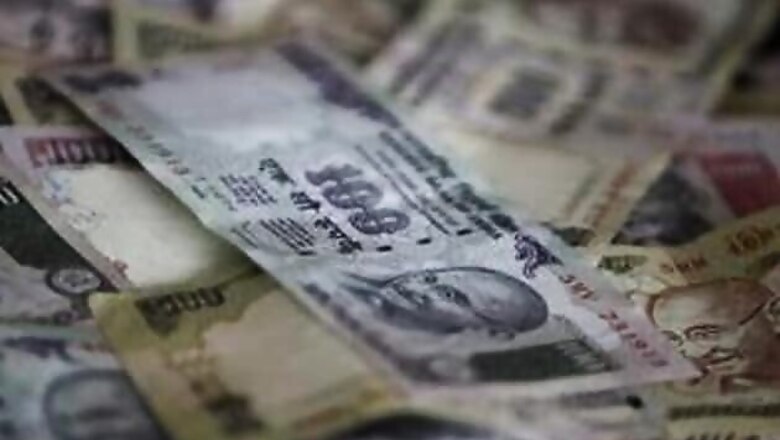
views
The Bharatiya Janata Party (BJP) set to form the next government, is debating scrapping or revising a plan to cut the fiscal deficit to a nine-year low over the next three years, sources with direct knowledge of the situation told Reuters.
While the BJP is not bound by the roadmap of the outgoing government, sticking to it will help stave off a possible downgrade by ratings agencies. Being cut to "junk" from investment grade could drive up borrowing costs and trigger capital outflows in Asia's third-largest economy.
India, among the so-called Fragile Five most vulnerable emerging market economies, saw its markets roiled by capital outflows from around May to September last year as investors positioned for the Federal Reserve to taper monetary stimulus.
The current five-year fiscal plan, unveiled in 2012 by the Congress-led government, pledges to narrow the deficit to 3 per cent of gross domestic product (GDP) by March 2017.
Outgoing Finance Minister P Chidambaram had won a reprieve from the agencies by narrowing the deficit by 1.1 percentage points in the past two years, yet critics question the quality of fiscal consolidation.
Last year, Chidambaram cut $13 billion in capital spending, deferred $16 billion in subsidies and squeezed $15 billion in dividends from state companies to lower the fiscal deficit to 4.6 per cent in the fiscal year that just concluded.
"What he has done is creative accounting," said a BJP economic adviser who spoke on condition of anonymity. "There is a strong view in the party that we should come out clean with a new credible roadmap with an equally credible action plan."
That view was shared by two other sources in the BJP, whose prime ministerial candidate Narendra Modi wants to revive growth and job creation. That in turn would boost both revenues and the size of the economy, reducing the deficit ratio over time.
In the short term, however, a fiscal audit could reveal a hole in the public finances and endanger New Delhi's existing commitment to cut the deficit to a seven-year low of 4.1 per cent in the fiscal year that began in April.
That pledge rests on Chidambaram's assumptions that federal spending would grow by 10.9 per cent, compared with a recent average of about 15 per cent, and revenues beat a prolonged economic slowdown to grow by 18 per cent.
New Delhi has missed its revenue projections for three years in a row and this year's projections look equally unrealistic.
India faces the biggest threat of a downgrade from Standard & Poor's, which rates it at BBB minus with a negative outlook. Since April 2012, S&P has often flagged concerns over the country's fiscal health and urged subsidy and tax reforms.
Similarly, Fitch Ratings called for a clear fiscal consolidation strategy that doesn't come at the cost of investments that could underpin faster growth in future.
"I would like to see the next government invest aggressively in capital expenditure and infrastructure creation and at the same time be able to generate revenues to fund it," said Kishore Gandhi, chief credit officer at India Ratings & Research, a Fitch Group company.
Exit polls after the five-week general election showed that Modi's BJP is likely to unseat the Congress party that has presided over the worst economic slowdown since the 1980s.
Together with its allies, the BJP is shown by most of the exit polls winning an outright parliamentary majority. Results are due on Friday.
Radhika Rao, an economist with DBS Bank in Singapore, said the next government could get away with a marginal deficit increase if it produced a credible mid-term restructuring plan.
"You can revise it up to 4.5 per cent from 4.1 per cent and say this is based on your (latest) growth and tax revenue estimates," she said. "But you will need to display a willingness and clear intent to bring it down over the next couple of years."
"SLEEPLESS NIGHTS"
Arun Jaitley, a senior BJP leader and favourite to become finance minister, told Firstpost last week that the new government would have to lift the "mask" on the budget and reveal its true position.
"The next government will have sleepless nights correcting the accounts of Mr Chidambaram," Jaitley told the website.
In anticipation of a Modi win, Indian shares have surged to record highs and the rupee rallied to its strongest in 10 months. A "junk" rating could revive memories of last summer's sell-off, which had sent the rupee on a free fall.
However, BJP leader Gopal Agarwal dismissed such fears. "The market already knows these (budget) figures are not correct. Already this has been discounted," he said.
Expectations that some spending cannot be deferred have turned investors sceptical the new government can meet this year's deficit target. Many are anticipating a higher shortfall in a new budget, due by July.
Although the BJP leaders, including Jaitley, have yet to commit to a timeframe for restating public accounts, officials in the finance ministry are advising caution as any such move could trigger a ratings action.
They attribute the problem to India's cash accounting, in which income and expenses are recorded when cash is paid. Many advanced economies follow accrual accounting, in which payments are recorded as they occur regardless of whether cash has actually changed hands.
"Switching to accrual accounting will take care of this issue. But it can't be done overnight," said one senior ministry official. "Until then, you have no option but to stick to stated fiscal deficit targets."




















Comments
0 comment